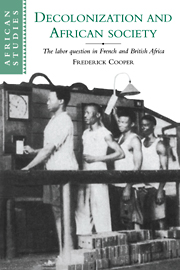Book contents
- Frontmatter
- Contents
- List of tables and figure
- Preface
- List of abbreviations
- Map of French and British colonial Africa
- 1 Introduction
- Part I The dangers of expansion and the dilemmas of reform
- Introduction
- 2 The labor question unposed
- 3 Reforming imperialism, 1935–1940
- 4 Forced labor, strike movements, and the idea of development, 1940–1945
- Conclusion: posing the labor question
- Part II Imperial fantasies and colonial crises
- Part III The imagining of a working class
- Part IV Devolving power and abdicating responsibility
- Conclusion
- Notes
- Bibliography
- Index
- OTHER BOOKS IN THE SERIES
4 - Forced labor, strike movements, and the idea of development, 1940–1945
Published online by Cambridge University Press: 22 February 2010
- Frontmatter
- Contents
- List of tables and figure
- Preface
- List of abbreviations
- Map of French and British colonial Africa
- 1 Introduction
- Part I The dangers of expansion and the dilemmas of reform
- Introduction
- 2 The labor question unposed
- 3 Reforming imperialism, 1935–1940
- 4 Forced labor, strike movements, and the idea of development, 1940–1945
- Conclusion: posing the labor question
- Part II Imperial fantasies and colonial crises
- Part III The imagining of a working class
- Part IV Devolving power and abdicating responsibility
- Conclusion
- Notes
- Bibliography
- Index
- OTHER BOOKS IN THE SERIES
Summary
The governments which ruled French West Africa and British Africa during the early war years had one characteristic in common: both were planning for futures that did not exist. Looking beyond the war itself, London's and Vichy's colonial leaders envisioned a rational, planned world, where the concept of development would rule supreme. London looked toward evolutionary economic and social change leading eventually to political devolution; Vichy thought in terms of top-down control utilizing every resource to an optimal degree to make the French empire a coherent and prosperous whole. As the central bureaucracies enjoyed their imperial dream, African workers – facing heightened demands for labor, fewer goods to consume, and escalating compulsion – were living a colonial nightmare. Local officials were frightened themselves.
The difference between the dream and the nightmare would soon prove central to the collapse of the colonial project: empire was not, after all, such a good laboratory of modernity. The will of colonized people kept intruding itself into the apparatus of control. African workers forced colonial planners who wanted to think about development think instead about the labor question.
This came about in quite different ways in the two empires. In the European war, France fell quickly. Its African empire split, as officials in Equatorial Africa remained loyal to de Gaulle while those in West Africa submitted themselves to Vichy. Vichy, in line with its fascisant conception of a rational order in which each social group took its place, set out its coordinated development program allocating investment to each region in accordance with its particular advantages.
- Type
- Chapter
- Information
- Decolonization and African SocietyThe Labor Question in French and British Africa, pp. 110 - 166Publisher: Cambridge University PressPrint publication year: 1996
- 1
- Cited by



